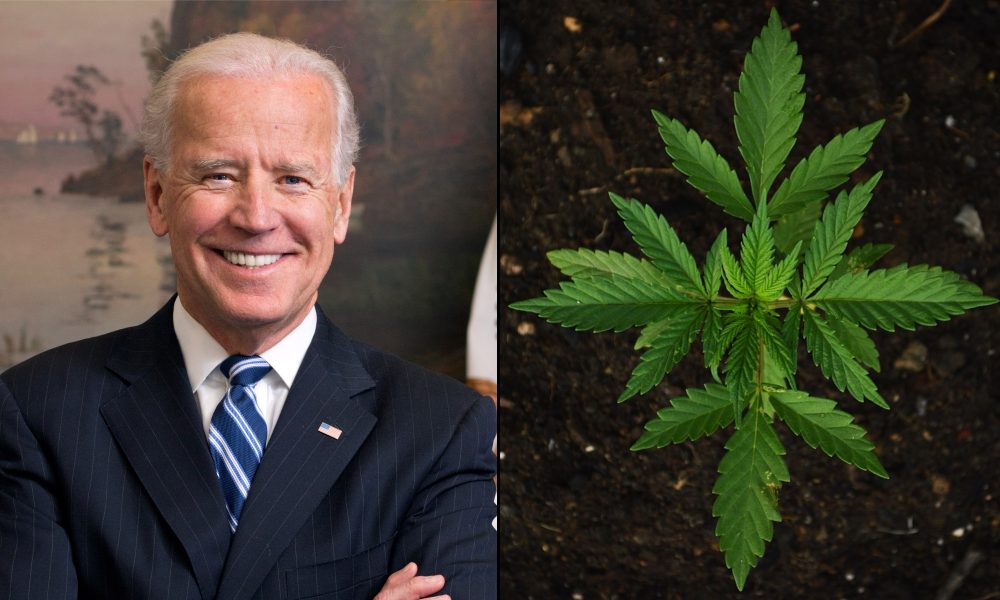President Joe Biden stands to make significant political gains if marijuana is rescheduled under his administrative directive, according to a new survey that reveals majority support for the reform. It also found that marijuana enjoys greater favorability with voters compared to Biden and former President Donald Trump.
The poll conducted by Lake Research Partners and commissioned by the Coalition for Cannabis Scheduling Reform (CCSR) showed that 58 percent of likely voters favor loosening federal marijuana laws by moving it from Schedule I to Schedule III of the Controlled Substances Act (CSA). Just 19 percent oppose it.
But perhaps even more critically for Biden heading into the election later this year, the survey found that voters’ impression of the president jumped a net 11 points after hearing about the implications of the rescheduling review that the president initiated—and that includes an 11-point favorability swing among young voters 18-25 who will be critical to his reelection bid.
What it seems to indicate is that voters who are exposed to the rescheduling debate and the president’s role in the process view him more favorably.
Of course, Biden doesn’t directly control the final outcome. The U.S. Department of Health and Human Services (HHS) recommended the rescheduling action upon completion of a scientific review last year, but the Drug Enforcement Administration (DEA) reserves “final authority” in the matter.
The president has expressed opposition to the plant’s current classification in Schedule I alongside drugs like heroin, but he does not grant final approval to whatever decision DEA makes. Even so, the survey, first reported by Politico, signals that he would benefit if DEA does go along with the HHS recommendation on his watch.
“Support for loosening weed restrictions cuts across all demographic groups and political affiliations, but was highest among 18- to 25-year olds: 65 percent supported the administration’s moves and just 14 percent opposed.”
— Coalition for Cannabis Scheduling Reform (@SchedReform) January 18, 2024
A memo for the survey suggests that respondents were given the impression that the president has a further role, as it asked whether he should “accept” or “reject” the HHS Schedule III recommendation. Procedural nuance notwithstanding, 66 percent said he should accept it. Voters aged 18-25 were more forceful, with 83 percent saying he should accept it, including 77 percent who said they feel strongly about that point.
As is typically the case with cannabis reform polling, Democrats were the most supportive of reform, with 74 percent in favor of the rescheduling proposal. A majority of independents (55 percent) shared that support, while Republicans were the most divided, with a 41 percent plurality backing rescheduling while 31 percent stood opposed. Support grew among Republican women and young conservatives.
When respondents were presented with arguments against rescheduling that intentionally mischaracterized the reform in a negative light—calling it a “half measure” from a “weak president”—that had virtually no impact. Fifty-eight percent of voters still backed the reform, and opposition fell one percentage point.
Meanwhile, respondents were also read arguments in favor of rescheduling that seemed to mischaracterize the reform’s actual impact. For example, they were told that reclassifying cannabis would “bring in significant tax revenue, which could be invested in public health and safety”—but moving the drug to Schedule III would in fact give the industry sizable tax breaks by exempting them from the 280E penalty that prevents business expense deductions.
The Congressional Budget Office, in a 2017 analysis, estimated that repealing the 280E provision’s application on state-legal cannabis businesses would actually result in a $5 billion loss to federal coffers over a 10-year period, though it’s not clear if the review examined the broader economic impact of the reform on marijuana industry activity beyond simply allowing the deductions.
The pro-reform statement in the poll also told respondents that rescheduling would “provide struggling farmers with a source of legitimate income” and “usher in long overdue criminal justice reforms”—but as a Congressional Research Service (CRS) report that was released on Tuesday that laid out the limitations of rescheduling explains, participants in state cannabis markets would continue to run afoul of federal law, and existing criminal penalties for certain marijuana-related activity would remain in force.
With respect to overall favorability in the survey, marijuana on its own polled at 51 percent, including about half who the held “very” favorable views. Biden, by contrast, had a 41 percent favorability rating, while Trump’s favorables were at 42 percent. The cannabis industry, meanwhile, came in at 48 percent favorable.
The survey, conducted from October 2-9 and released this week, involved interviews with 900 likely voters, including oversamples of 100 younger voters 18-25 and 200 swing state voters. The margin of error is +/- four percent.
Biden has routinely touted his 2022 scheduling directive, as well as a mass pardon he granted for people who’ve committed federal marijuana possession offenses. He followed up on that action last month with a renewed and expanded pardon proclamation.
In October, advocates and lawmakers who support cannabis reform marked the one-year anniversary of Biden’s mass marijuana pardon and scheduling directive by calling on him to do more—including by expanding the scope of relief that his pardon had and by expressly supporting federal legalization.
Democratic presidential candidates, including Rep. Dean Phillips (D-MN) and Marianne Williamson, have also taken Biden to task for failing to go further on cannabis reform.
Read the CCSR-commissioned poll memo on Biden and marijuana rescheduling below:
Minnesota Marijuana Regulators Recommend Fixes To Legalization Law To Speed Up Licensing And Open Minimum Of 381 Retailers
Read the full article here









